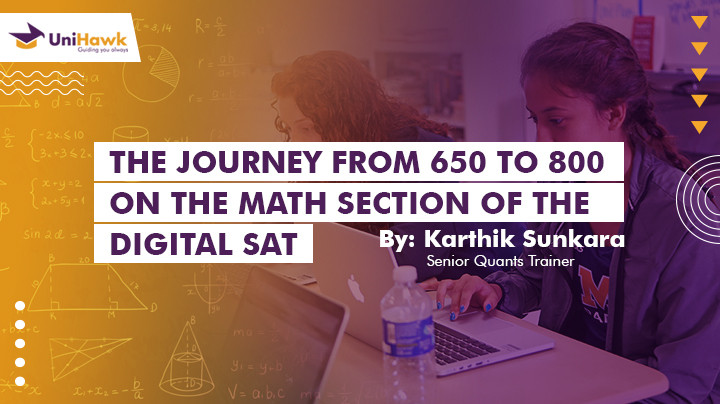Introduction:
Achieving a perfect score on the math section of the digital SAT is a remarkable feat that requires dedication, perseverance, and a solid understanding of the tested concepts. In this blog, we will delve into the journey of transforming a score of 650 to a perfect 800 on the math section of the digital SAT. We will explore the key strategies, study techniques, and resources that can help students accomplish this remarkable goal.
1.Assessing the Starting Point (Score of 650):
Before embarking on the journey towards a perfect score, it is essential to analyze the strengths and weaknesses that contributed to the initial score of 650. This analysis will help identify the specific areas that require improvement, allowing for a targeted study plan. By reviewing the breakdown of topics and question types within the math section, students can gain insights into where they need to focus their efforts.
2.Understanding the Digital SAT Format:
The digital SAT introduces a unique format that requires students to adapt their test-taking strategies accordingly. Familiarizing oneself with the digital interface, the navigation tools, and the calculator functions is crucial for maximizing efficiency and reducing test anxiety. Practicing with online resources and taking official practice tests in a simulated digital environment will help build familiarity and confidence.
3.Designing an Effective Study Plan:
Creating a structured study plan is vital for consistent progress towards the goal of an 800 on the math section. Breaking down the topics into manageable chunks and allocating dedicated study time for each will ensure comprehensive coverage. Engaging with high-quality study materials, such as SAT prep books, online courses, and interactive learning platforms, will provide the necessary content review and practice opportunities.
4.Mastering the Tested Concepts:
To excel in the math section, a solid understanding of the tested concepts is paramount. Students should focus on strengthening their knowledge in areas such as algebra, geometry, data analysis, and advanced math topics. Identifying personal weaknesses and dedicating extra time to practice those specific areas is key. Utilizing resources like Khan Academy and College Board’s Official SAT Practice can provide targeted practice questions aligned with the digital SAT format.
5.Developing Test-Taking Strategies:
In addition to content mastery, employing effective test-taking strategies can significantly impact one’s score. Understanding the different question types, utilizing the process of elimination, and strategically managing time are vital skills. Regularly practicing with timed, full-length practice tests will help develop pacing techniques and enhance overall test-taking abilities.
6.Seeking Additional Help:
Sometimes, seeking external assistance can provide the necessary guidance to overcome challenges and achieve that perfect score. Working with tutors, attending SAT prep classes, or joining study groups can offer valuable insights, personalized feedback, and peer support.
7.Consistency, Practice, and Review:
Consistency and practice are the pillars of success when aiming for an 800 on the math section of the digital SAT. Consistently dedicating time to study, practicing regularly, and reviewing mistakes are essential steps towards improvement. The process of analyzing incorrect answers, understanding the underlying concepts, and revisiting weak areas will contribute to a stronger foundation and increased accuracy.
Conclusion:
Achieving a perfect 800 on the math section of the digital SAT is a challenging but attainable goal. With the right strategies, dedicated study, and consistent practice, students can transform their initial scores and witness significant improvement. By assessing strengths and weaknesses, adapting to the digital format, mastering the tested concepts, employing effective test-taking strategies, seeking assistance when needed, and maintaining consistency, students can pave their way to success and unlock their full potential on the digital SAT. Remember, it’s not just about the destination but the growth and knowledge gained during the journey.
By: Karthik Sunkara, Senior Quants Trainer





